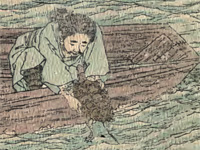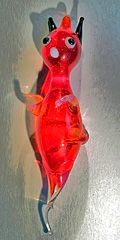Dedications
-
This novel, in loving memory,
is dedicated to Stanley G. Weinbaum,
for his having given the world his story,
“A Martian Odyssey.”Philip K. Dick and Roger Zelazny, Deus Irae, 1976.
This novel, in loving memory,
is dedicated to Stanley G. Weinbaum,
for his having given the world his story,
“A Martian Odyssey.”Philip K. Dick and Roger Zelazny, Deus Irae, 1976.
“I may not be a prentice anymore,” said Alvin, “but that don’t mean I’m a master. I’m just a journeyman.”
“Then hire on somewhere,” said Taleswapper. “You’ve still got things to learn.”
[…]
Go or stay, that’s up to you. But I can tell you this. Either you will go now, of your own free will, or you will go soon anyway, but not freely. You’re a journeyman smith ー you will have your journey.
[…]
“What’s your brother’s name?” asked Verily.
“Does that matter?” asked Calvin, a faint sneer in his voice. “Planning a visit to the backwoods soon?”
“Is that where you’re from? The backwoods?” asked Verily.
Calvin immediately backtracked. “Actually, no, I was exaggerating. My father was a miller.”
“How did the poor man die?” asked Verily.
“He’s not dead,” said Calvin.
“But you spoke of him in the past tense. As if he were no longer a miller.”
“He still runs a mill,” said Calvin.
“You still haven’t told me your brother’s name.”
“Same as my father’s. Alvin.”
“Alvin Miller?” asked Verily.
“Used to be. But in America we still change our names with our professions. He’s a journeyman smith now. Alvin Smith.”
“And you remain Calvin Miller because…”
“Because I haven’t chosen my life’s work yet.”
Orson Scott Card, The Tales of Alvin Maker IV : Alvin Journeyman, 1995.
journeyman n
old-fashioned
[Date: 1400-1500; Origin: journey ‘day’s work’ (13-19 centuries) + man]
1) a trained worker who works for someone else
2) an experienced worker whose work is acceptable but not excellent [LDCE]
alumnus n pl. alumni
A male graduate or former student of a school, college, or university.
Usage Note: Alumnus and alumna both come from Latin and preserve Latin plurals. Alumnus is a masculine noun whose plural is alumni, and alumna is a feminine noun whose plural is alumnae. Coeducational institutions usually use alumni for graduates of both sexes. But those who object to masculine forms in such cases may prefer the phrase alumni and alumnae or the form alumnae/i, which is the choice of many women’s colleges that have begun to admit men. (AHD4)
alum n AMERICAN INFORMAL
someone who was a student at a particular high school, university, or college:
alum of: She and I are alums of the same university. (MEDA)
“They cost money.”
“I’ll pay for it, Carl Lee! Listen to me! I’ll pay for it all. You’ll have the best lawyer and doctors money can buy, and your old pal Cat will pay the tab. Don’t worry ‘bout money!”
John Grisham, A Time to Kill, 1989
「金がかかるだろうが」
「費用ならおれに出させてくれよ、カール・リー! おれのいうとおりにするんだ! 費用は全額おれが出す。そうすりや、おまえさんは金で買える最上の弁護士と医者をつけられるんだぞ。費用は一切合財、この旧友のキャットさまが出すといってるんだ。だから、金の心配はするんじゃない!」
ジョン・グリシャム『評決のとき(上)』,白石朗 訳,新潮文庫,pp.319-320.
In my catalogue notes I wrote: “The marriage of reason and nightmare which dominates the 1960s has given birth to an ever more ambiguous world. Across the communications landscape stride the spectres of sinister technologies and the dreams that money can buy. Thermonuclear weapons systems and soft-drink commercials coexist in an uneasy realm ruled by advertising and pseudo-events, science and pornography.
J.G. Ballard, The Kindness of Women, 1991
Maybe he really did have a “magic touch,” but he also had a talent for finding capable people to work for him. He paid them high salaries and treated them well, and they in turn worked hard for him. “When I know I’ve got the right guy, I put a wad of bills in his hand and let him do his thing,” he once told me. “You’ve got to spend your money for the things that money can buy, not worry about profit or loss. Save your energy for the things that money can’t buy.”
Haruki Murakami, The Wind-Up Bird Chronicle, trans. Jay Rubin, 1998
You must understand that the general public did not know, at that time, that time-travel was being investigated. It was not an expensive project as long as it was a matter of working on theory, but experimental work had punished the budget and was bound to punish it still more. This was most uncomfortable for scientists engaged in an endeavor that seemed totally “blue-sky.”
William F. Wu, Isaac Asimov’s Robots in Time 1: Predator, 1993
This Sunday supplement article, now nearly six weeks old and smelling pungently of shed and woodbox, quoted two local psychiatrists who had been perfectly happy to blue-sky the situation as long as their names weren’t printed. One of them mentioned a particular sexual aberration – the urge to commit some violent act at the moment of orgasm. Nice, Johnny thought, grimacing. He strangled them to death as he came. His headache was getting worse all the time.
Stephen King, The Dead Zone, 1979
“You’re right, of course,” Glen muttered, and ran a hand over his sandpapery cheek. “Harold, I apologize. I’m very upset. I knew this sort of thing could happen ー pardon me, would happen ー but I guess I only knew it in an academic way. This is a lot different than sitting in the old study, blue-skying things.”
Stephen King, The Stand, 1978
This is why some of the world’s biggest and most tough-minded corporations, once the living embodiment of presentism, today hire intuitive futurists, science fiction writers and visionaries as consultants. A gigantic European chemical company employs a futurist who combines a scientific background with training as a theologian. An American communications empire engages a future-minded social critic. A glass manufacturer searches for a science fiction writer to imagine the possible corporate forms of the future. Companies turn to these “blue-skyers” and “wild birds” not for scientific forecasts of probabilities, but for mind-stretching speculation about possibilities.
Alvin Toffler, Future Shock, 1970
A rented motorboat had turtled and its sole occupant was clinging to the hull while two lifeguards struggled to get her into the rescue boat.
Joseph Wambaugh, Floaters, 1996
‘When we were little,’ the Mock Turtle went on at last, more calmly, though still sobbing a little now and then, ‘we went to school in the sea. The master was an old Turtle — we used to call him Tortoise —’
‘Why did you call him Tortoise, if he wasn’t one?’ Alice asked.
‘We called him Tortoise because he taught us,’ said the Mock Turtle angrily: ‘really you are very dull!’
クイズそのいち) 「浦島太郎[うらしまたろう]」で、助けてもらったカメは「turtle」か「tortoise」のどっち? 答えは「turtle」。海の深いところにある竜宮城[りゅうぐうじょう]まで浦島太郎[うらしまたろう]を連れてってあげたんだもんね。
 陸亀が tortoise で海亀が turtle、というふうに明確に二分されているなら、浦島太郎が助けた亀は turtle であって、tortoise と書けば、その答案は×になるだろう。
陸亀が tortoise で海亀が turtle、というふうに明確に二分されているなら、浦島太郎が助けた亀は turtle であって、tortoise と書けば、その答案は×になるだろう。
ところが、お雇い外国人チェンバレンが訳した浦島太郎では、tortoise となっている。長谷川武次郎による挿絵も海亀には見えないが、これはとりあえず英語と関係がない。
Well, one day he went out in his boat to fish. But instead of catching any fish, what do you think he caught? Why! a great big tortoise, with a hard shell and such a funny wrinkled old face and a tiny tail. Now I must tell you something which very likely you don’t know; and that is that tortoises always live a thousand years, at least Japanese tortoises do.
The Fisher-Boy Urashima, translated by B. H. Chamberlain, 1886
ついでに、ジョンソン博士の辞書も見ておくと、
tortoise Animal covered with a hard shell : there are tortoises both of land and water.
turtle It is used among sailors and gluttons for a tortoise.Samuel Johnson, A Dictionary of the English Language, 1755
サミュエル・ジョンソン(1709-1784)とチェンバレン(1850 – 1935)は、どちらもイギリス人だった。
privateer n
an armed ship in the past that was not in the navy but attacked and robbed enemy ships carrying goods [LDCE]
buccaneer n
a pirate, esp one who preyed on the Spanish colonies and shipping in America and the Caribbean in the 17th and 18th centuries [CED]
“What’s a privateer?” Steve asked, puzzled. “Some kind of buccaneer?”
“Sort of.” Rita laughed. “The line was always blurry. Basically, a government that was at war would commission pirates to fight for them against the enemy. In peace, pirates might attack any ship they wanted. The trouble is, the term turns on a legal technicality. They were basically the same people, doing the same things.”
William F. Wu, Isaac Asimov’s Robots in Time 2: Marauder, 1993
From 1660 until 1720, the so-called golden age of piracy, pirates again operated as privateers. This period saw some sailing under the famous “Jolly Roger” flag, with attacks by English pirates on both Spanish and French ships. There were also English attacks on the Dutch; the island of Saint Eustatius, a Dutch sugar island, was attacked by pirates and British soldiers on many occasions, changing hands 10 times during the 1660s and early 1670s. French pirates also started operating freely from their ports on the island of Hispaniola (modern-day Haiti and the Dominican Republic). Sir Henry Morgan, a Welsh buccaneer, sacked the Spanish town of Portobelo in Panama, which had been well garrisoned.
Justin Corfield, “Piracy in the Atlantic World”, in Encyclopedia of World History, vol. 3, Facts On Files, p. 309
オックスフォードの「生化学・分子生物学辞典」で、軟骨 cartilage の項を見たときに、そのひとつ前にあった単語が、コレ。”Cartesian diver” or “Cartesian devil”。「デカルトの潜水夫」または「デカルトの悪魔」。
Cartesian diver or Cartesian devil a device, devised as a toy, adapted as an ultramicrorespirometer, consisting of a small piece of capillary glass tubing open at one end and closed and slightly expanded at the other.
Oxford Dictionary of Biochemistry and Molecular Biology, revised edition, Oxford University Press, 2000
元々は「おもちゃ」の「ウルトラマイクロ呼吸計」? 「ウルトラマイクロ呼吸計」よりは「おもちゃ」に惹かれて調べてみると、どこかで見たことがあるような、ないような。日本語では「浮沈子」(ふちんし) というらしい。理科の実験にも使われたりしているようだ。
A Cartesian diver or Cartesian devil is a classic science experiment, named for René Descartes, which demonstrates the principle of buoyancy (Archimedes’ principle) and the ideal gas law.
The Cartesian diver demonstrates not only buoyancy, but the implications of the ideal gas law and Pascal’s principle as well.
 なんでも「アルキメデスの原理」のみならず「理想気体の法則」や「パスカルの原理」まで証明してくれるすぐれもののおもちゃであるらしい。すばらしい。画像は、Wikipedia から。ドイツのガラス工芸で有名なラウシャという町のお土産のようだ。これには悪魔というより「おばけ」という言葉がぴったりだ。かわいい「デカルトのおばけ」。ちなみに、ドイツ語でもデカルトの潜水夫 Cartesischer Taucher というらしい。
なんでも「アルキメデスの原理」のみならず「理想気体の法則」や「パスカルの原理」まで証明してくれるすぐれもののおもちゃであるらしい。すばらしい。画像は、Wikipedia から。ドイツのガラス工芸で有名なラウシャという町のお土産のようだ。これには悪魔というより「おばけ」という言葉がぴったりだ。かわいい「デカルトのおばけ」。ちなみに、ドイツ語でもデカルトの潜水夫 Cartesischer Taucher というらしい。